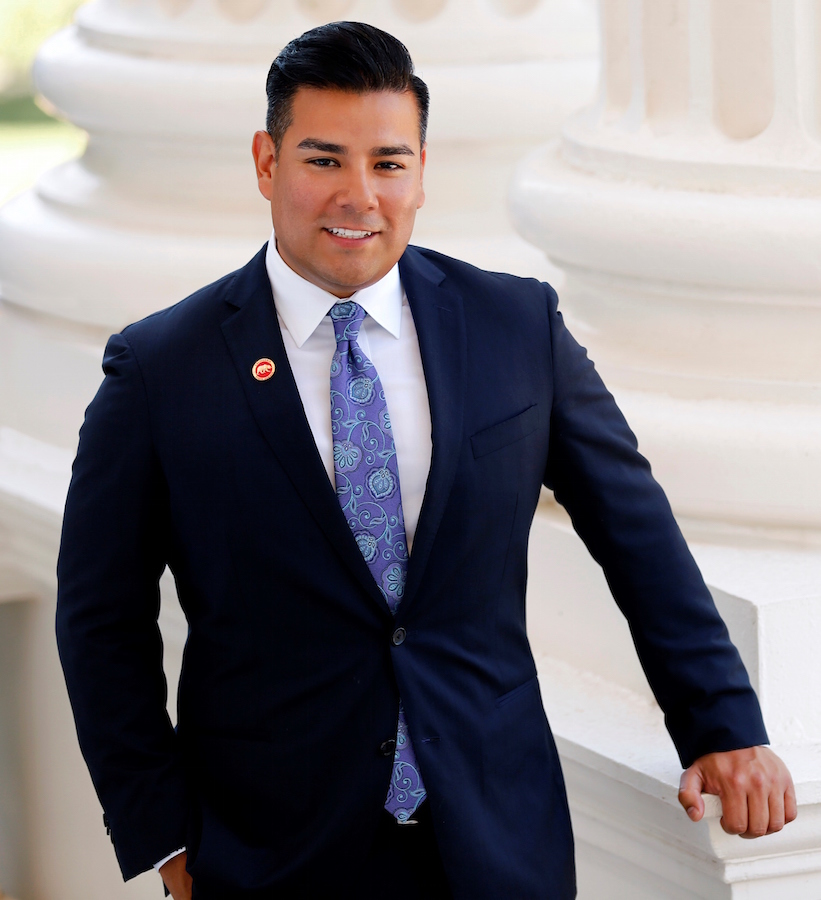
Attendees of a rally hosted in February at Harvey Milk Park holding signs in support of State Senator Ricardo Lara’s single-payer health care bill. Photo: Jason Ruiz
An extended version of the proposed single-payer healthcare bill unveiled last month was released today, revealing some of the more intricate policies inside what was previously a skeleton of a health care bill named the Healthy California Act.
 Senate Bill 562, originally introduced by State Senators Ricardo Lara and Tony Atkins, now has nine Democratic co-authors from both houses of the legislature that took the original piece of legislation and expanded it by some 12,000 words.
Senate Bill 562, originally introduced by State Senators Ricardo Lara and Tony Atkins, now has nine Democratic co-authors from both houses of the legislature that took the original piece of legislation and expanded it by some 12,000 words.
State Senators Benjamin Allen, Cathleen Galgiani, Mike McGuire and Nancy Skinner, as well as Assembly Members Rob Bonta, David Chiu, Laura Friedman, Adrin Nazarian and Tony Thurmond, all contributed to the expanded legislation that, if passed, could be a historic move for the state.
Lara, who represents most of Long Beach, hosted a rally for the bill at Harvey Milk Park last month where a few hundred people showed up to support the senator’s efforts to bring universal health care to California. Mayor Robert Garcia noted that the bill’s number was not accidental as it was purposefully linked to the area code that Lara calls home.
The release of the expanded bill text comes at an important time at both the federal and local level given that in the past week Republican efforts to repeal and replace the Affordable Care Act failed before holding a vote on the House floor, and Lara formally announced that he would be running for the statewide elected position of California Insurance Commissioner in 2018.
“With Republicans’ failure to repeal the Affordable Care Act, Californians really get what is at stake with their health care,” Lara said in a statement. “We have the chance to make universal healthcare a reality now. It’s time to talk about how we get to healthcare for all that covers more and costs less.”
RELATED
State Senator Ricardo Lara Announces Bid for the State Insurance Commissioner’s Seat in 2018
A spokesman from Lara’s office said all Californians would be enrolled through the act, but noted that the bill currently does not spell out whether that would be voluntary or through a mandate.
Highlights of the bill text released Thursday include provisions to the act that would eliminate co-pays and insurance deductibles for those covered under the plan. Patients would be allowed to choose from a larger list of health care providers as they would not be bound to those covered by private insurers, rather it would be those in the state’s network.
Californians would also be covered while they travel and would not need a referral from a primary care physician to see other providers in the network. The bill would also give latitude to health care professionals to make decisions about care, granting them the ability to override computers or clinical practice guidelines in the best interest of the patient.
It would encompass medical care including inpatient, outpatient, emergency services and transportation, dental and vision care. It would also cover rehabilitation services, child and adult immunizations, care in skilled nursing and assisted living facilities as well as services for substance abuse, mental health and even chiropractic and acupuncture.
One item conspicuously missing from the act’s outline were contraceptives, however, Lara’s spokesman said they believed it would be covered under the law.
The law would also establish a nine-member board to oversee and implement policy for the statewide health law which would include experts in the healthcare industry, and those appointed by the governor, senate committee on rules and the assembly speaker. A public advisory commission made up of registered nurses, dentists, pharmacists and consumers of healthcare, among others, would also help advise if the law were to be passed.
Funding for Healthy California and a detailed proposal over how the state would pay for its nearly 40 million residents to enroll in a universal healthcare system have yet to be hammered out. During the brief negotiations during Republicans’ attempt to dismantle Obamacare, President Donald Trump and House Speaker Paul Ryan said under the law’s replacement states would be granted the ability to decide how to use federal funds given to them from the federal government.
RELATED
As White House Moves to Gut Healthcare, Lara Rallies Support Behind Single-Payer in California
Currently, the state receives per-capita funding from the federal government and the version of the law proposed by Republicans earlier this month called for block-grants which would not account for larger enrollments in state Medicare programs in the future. The law would require the state to apply for a waiver from the federal government to reallocate the dollars to the Healthy California Act’s fund rather than federal programs like Medi-Cal, the Children’s Health Insurance Program, Medicare and the Affordable Care Act.
Lara and Atkins are not the only ones proposing a version of universal healthcare as Lieutenant Governor Gavin Newsom, who is running to replace Governor Jerry Brown next year, floated the idea of making that a central focus of his campaign, and United States Senator Bernie Sanders announced recently that he plans to introduce legislation in Washington DC that would potentially provide “Medicare for all.”
“The Affordable Care Act is still intact, and that is a good thing, but uncertainty remains, and we can’t afford to remain idle on healthcare,” Atkins said in a statement. “The framework outlined in the Healthy California Act is the option that we need on the table to take our state forward and provide healthcare for everyone.”

